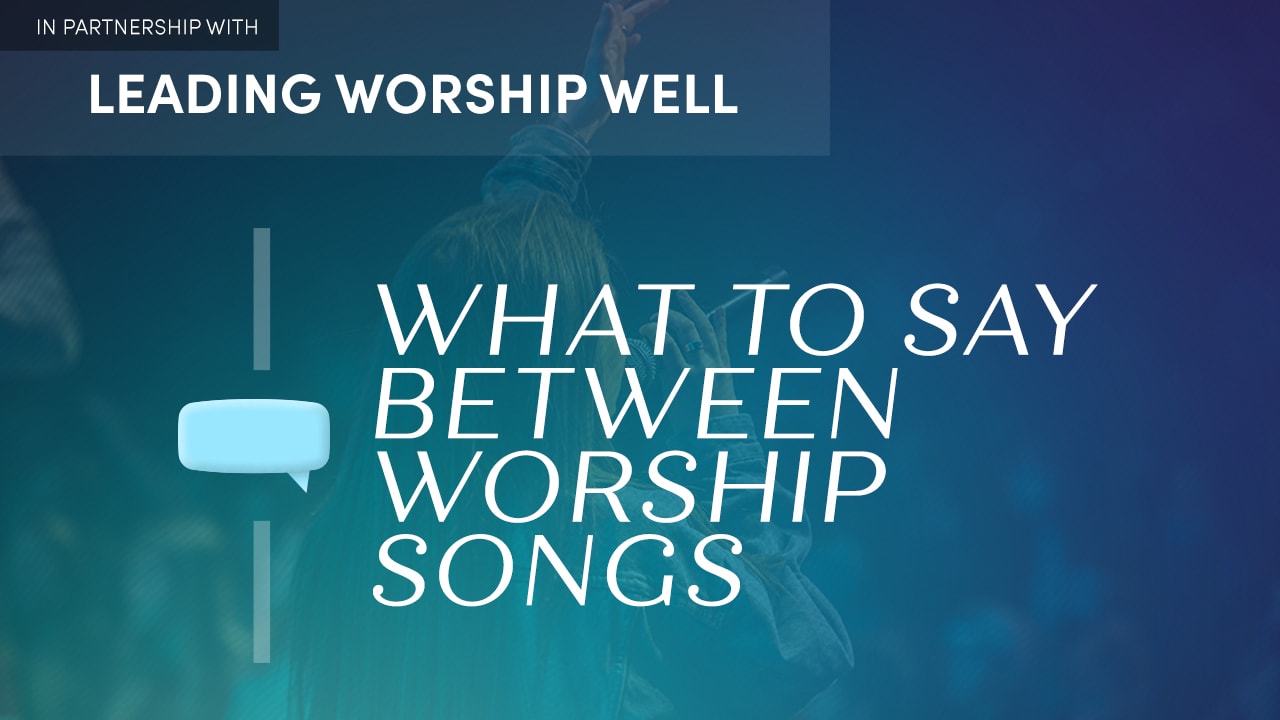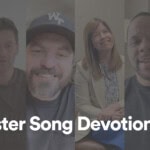Worship Teams
The 5-Minute Framework For Knowing What To Say Between Worship Songs

Have you ever struggled with figuring out what to say between worship songs?
It can be a daunting task for new AND seasoned worship leaders alike. And if you’re being completely honest, sometimes maybe you wish your job was to just get in front of your church, play five songs, and sit down.
BOOM! “I led worship.” That would make things a lot easier.
Sometimes we DO lead worship that way. But worship isn’t just led in the SINGING. Worship is also led in the SAYING. (I would technically argue worship is led MORE in the saying than in the singing. Anyone can get up there and play through some songs. It takes a real worship leader to confidently speak truth over their congregation and lead them in engaging with God.)
But I get it. It’s hard. And that’s why I want to share with you the 5-minute framework I use every week that helps me know what to say between worship songs – every single time.
By the time you’ve answered these four questions, you’ll know exactly what to say when you lead worship this Sunday.
The 5-Minute “What To Say Between Worship Songs” Framework
Here is a quick outline of what the framework looks like:
- Where are we headed?
- How are we getting there?
- What does my church need to know?
- What does my church need to do?
If you answer these four questions before you lead worship, you will ALWAYS know what to say between songs. Let’s take a deeper look at each question and how it helps us.
Where are we headed?
Before you decide what you will communicate to your church, you have to know WHERE you’re leading them.
One of my favorite worship-leading analogies is that worship leaders are tour guides. We are leading people on a journey. (And don’t be mistaken, that journey is not “into the presence of God.” Jesus has already made the way open for all believers. He does that work. We don’t.) We are simply leading people on a journey to the “highlights of God.”
It’s helpful to think of it this way. You could hire a tour guide to take you to the Grand Canyon. A normal tour guide may take you to the standard lookout spot and say, “Look, everyone! Here is the Grand Canyon! Isn’t it amazing?”
A GREAT tour guide wouldn’t just take you to the standard spot. They’d know four or five other lookouts that give you a different and more complete view. Doing so would give you an even greater appreciation for the Grand Canyon.
That’s what worship leaders do. In a macro sense, you are leading people to God. But on any given Sunday, you are leading the people of your church to a specific “lookout” spot. And God has a seemingly infinite amount of awesome views for us to take in and stand in awe of.
So answer the question SPECIFICALLY. Where are we headed? What’s the plan for your service? By the end of your service, what view of God will people ultimately end up at?
It will probably be helpful to work with your pastor on finding the answer to this question. Figure out what they’ll be preaching on and see how you can support where they feel God is leading your church.
How are we getting there?
Any good tour guide doesn’t just pick a destination, meet the group they’re leading at the trailhead, and hope and pray they find their way to the top of the mountain. They have a plan for how they’re going to reach the summit. They know which trails they’re going to take. They’ve probably even gone on the same journey before they try to lead others. (HINT: Worship through your worship set before you lead others in worship.)
So think about HOW you’re going to get people to the proverbial “lookout” on Sunday morning.
What are the specifics? Is there a certain order of songs you’ve chosen? Why did you arrange them the way you did? Do they have similar themes? Do they work in tandem to highlight a specific truth about God’s character? Maybe you have other special elements in your service to facilitate the journey? (Communion, videos, other creative features, etc.)
Figure out the path you’ll use to get to your destination. This comes in handy to not only figure out WHAT to say but also WHEN to say it.
You may find it helpful to sketch out a simple service outline. It can be your “map,” so to speak, of how you’ll reach your destination.
What does my church need to know?
So far, the first two questions were just for us as worship leaders. Our church doesn’t necessarily need to know the full itinerary of our journey. They’ll discover it along the way. However, while these questions didn’t really tell us WHAT to say, they were important in laying the foundation for our speaking transitions. The first two questions guard us against just saying whatever comes to mind. They create cohesion by ensuring that what we say fits within the context of our entire service.
Now that the legwork has been done, it’s time to start crafting what we’ll say between our worship songs. Our speaking transition is made up of two parts: knowledge and action.
Let’s start with asking: “What does my church need to know? What is the next piece of information my church needs to know to get to the next leg of the journey I’m leading them on?”
For instance, if you’ve picked three songs at the beginning of your service that all relate to the love God undeservedly pours out on us because your pastor is preaching Romans 5:8, “But God demonstrates His own love for us in this: While we were still sinners, Christ died for us.” Let your church know about it!
Your church will not recognize that connection unless you make it EXPLICIT to them. They haven’t been thinking about your service order the entire week as you have. They don’t even know that your pastor is preaching on that topic. So tell them! Don’t just have thoughts in your head; verbalize them to your church. What truth about God does your church need to know?
What does my church need to do?
Our worship leadership can’t end with simply giving people INFORMATION about God. We have to provide them with the opportunity to RESPOND to God.
What do you want the people of your church to DO with the truth they just heard? If you’re leading them on a journey to see God’s faithfulness, maybe they need to think about a situation in their own life where they’ve seen God be faithful. If you’re leading them in realizing that corporate worship isn’t just a personal worship experience but something that is meant to be enjoyed TOGETHER, maybe they need to sing the words of the song you’re leading over the people around them.
Whatever it is. Don’t just leave them with information. Help them respond to it. Worship isn’t just knowledge OF God; it’s a response TO God. That’s what worship leaders facilitate.
A great way to improve your worship leading!
Learning how to speak between worship songs is a great way to level up your worship leading. But even with the 5-minute framework, it takes a little while to figure it out. Luckily there are five other things that you can do before this Sunday that can INSTANTLY improve your worship leading.
That’s why I put together the FREE 5 Tips To Instantly Improve Your Worship Leading Audio Training!
In the training, you’ll learn five super simple things you can do this Sunday to ensure you confidently lead an engaging time of worship. The five things aren’t hard to do. You just have to know them and make a conscious effort to do them.
So let me walk you through leveling up your worship leading for this Sunday by clicking here and getting the FREE training.
What does the 5-Minute “What To Say Between Worship Songs” Framework look like in action?
We’ve gone over the four-question framework so you can use it to always know what to say between worship songs. But let’s see how it plays out in a real-life worship-leading scenario. I’ll use my upcoming Sunday service as an example.
Let’s answer our four questions together and see how the answers translate into a speaking transition.
1. Where are we headed?
My pastor will be preaching on Romans 8:28 – “And we know that in all things God works for the good of those who love Him, who have been called according to His purpose.”
We want the people of our church to recognize that God is faithful. We might not always get the results we want in the short term, but God, in His amazing sovereignty, knows how to use good and bad things for His glory.
2. How are we getting there?
The two songs in the middle of my set (Way Maker and Canvas and Clay) focus on how God is at work even when we can’t see it. This will lead to the topic of the message.
3. What does my church need to know?
They need to know that we’ll be focusing on the faithfulness of God this morning. They need to know that scripture says that God works ALL things for the good of those who love Him. Not just SOME things. ALL things. Even when we can’t see it.
4. What does my church need to do?
There are times in our lives when we can’t see that God is at work. Think of a situation in your life where things feel hopeless, and TRUST that God is working it for His glory and your good.
The speaking transition leading into the bridge of Way Maker:
“Maybe you’ve found it hard to see God at work in your life right now. Maybe it feels like everything is going wrong. You’ve made mistake after mistake or hit bad luck streak after bad luck streak. But this is what I know. I know that Paul says in Romans, ‘God works ALL things for the good of those who love Him and who are called according to His purpose.'”
Paul didn’t just say that God uses SOME things for good. Paul didn’t just say that God uses GOOD things for good. No, God uses ALL things. God, in His infinite wisdom, can use even the things that seem bad to us for His ultimate glory and our ultimate good. So would you trust in that with me as we sing these words together? Picture that circumstance in your mind where it seems like God could never work. And sing these words over it believing that they’re true.”
Try it this week!
Now you have the framework! It’s time for you to put it into action.
Answer these four questions about your Sunday service and start crafting your own speaking transitions for this Sunday:
- Where are we headed?
- How are we getting there?
- What does my church need to know?
- What does my church need to do?
And don’t forget! If you want to level up your worship leading for this Sunday, make sure to check out the FREE audio training I put together called 5 Tips To Instantly Improve Your Worship Leading.

About Spencer Cormany
LeadingWorshipWell.com is an online resource created by Spencer Cormany to help worship leaders lead themselves well, lead their churches well, and lead worship well. Through weekly training on the Leading Worship Well blog and Leading Worship Well YouTube channel, Spencer equips worship leaders with the tools to point people to the worthiness of God AND how to develop worship teams spiritually, relationally, and musically consistently. Spencer has been in worship ministry for over 15 years and is currently serving as the Director of Worship at Salem Church in Chambersburg, PA.






